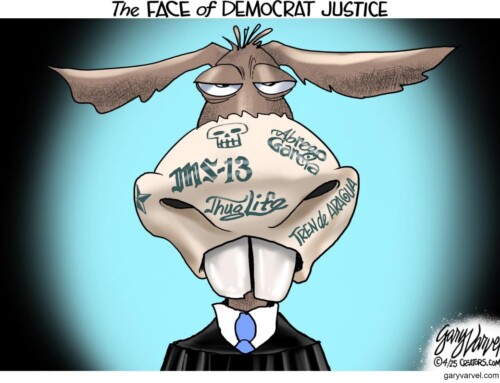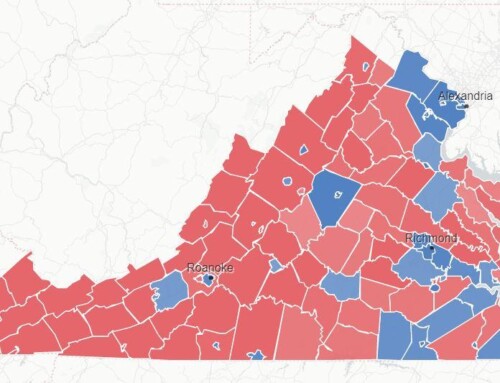From Attorney General Cuccinelli’s newsletter regarding the recent 4th circuit court ruling on Obamacare:
Sept 16, 2011
Dear Fellow Virginians and Americans,
As you all probably know, we heard from the Fourth Circuit last week in Virginia’s healthcare lawsuit.
The court decided unanimously to throw the case out on standing and not address the merits of our constitutional arguments.
However, the story is far more complicated than that. You may recall that Liberty University’s suit was heard at the very same time as Virginia’s. The court threw that case out as well; however, two of the judges stated what they would have done on the merits, and that has interesting implications as we press on to the Supreme Court.
Here are the things I’m going to address today:
-The court’s ruling that Virginia lacks standing to bring the lawsuit;
-The implications of the court’s standing ruling for state sovereignty; and
-The extraordinary position of the court as compared with Federalist 51 (you know, written by that radical guy by the name of James Madison…).Then I’ll do a quick walk-through of the Liberty ruling, and I’ll explain how it relates to Virginia’s case. Finally, I’ll note the three unique aspects of what this court did last Thursday that make the decisions true outliers that need to be corrected.
The Court’s Ruling
Before the federal health care bill became law, Virginia passed the Virginia Health Care Freedom Act (VHCFA). The VHCFA applies to employers and governments in Virginia and anyone else who might seek to force a Virginian to buy health insurance. With limited exceptions, it provides that no one can mandate that a Virginian buy health insurance.
Along came the federal government and passed the federal health care bill. In that bill was the individual mandate requiring most all citizens to buy federal government-approved health insurance. The individual mandate conflicted with the VHCFA, and under the supremacy clause the federal law would trump; however, the supremacy clause does not apply if the federal law is unconstitutional.
Thus was born Virginia’s lawsuit.
We sued the day the President signed the bill – May 23, 2010 – the 235th anniversary of Patrick Henry’s ‘give me liberty, or give me death’ speech. So began our fight for liberty against the unconstitutional federal mandate.
To bring any lawsuit, a plaintiff must have what is called “standing.” Standing is the right to sue.
To have standing, a plaintiff has to be able to show three things: 1) an injury; 2) that is currently occurring or is certain to occur; and 3) the court must be able to remedy the injury if the plaintiff wins.
Virginia’s injury is that the federal government’s health care law stops Virginia from exercising its legal authority to regulate health insurance mandates using the VHCFA.
This is an injury unique to a state. You and I don’t have a code of laws. States do. And States have the right to protect their code of laws. In fact, as attorney general, I have an obligation to protect Virginia’s laws (the district court judge in our case explicitly noted that responsibility).
Our suit was premised on redressing this sovereign injury. However, the Fourth Circuit rejected our position, stating that, to allow Virginia to bring this suit would allow States to act as “roving constitutional watchdogs” over the federal government. And yes, that quote comes straight from the opinion!
We now know what caused the earthquake in Virginia – James Madison obviously saw a draft version of the final order and rolled over in his grave!
This ruling is an extraordinary assault on state sovereignty and the role for States envisioned by the Founders in our constitutional system.
If you read Federalist 51 – written by that constitutional radical from Virginia, James Madison – you will find that States are supposed to check federal power when the federal government gets outside its constitutional authority!!!
From Federalist 51:
“In the compound republic of America, the power surrendered by the people is first divided between two distinct governments
[federalism], and then the portion allotted to each subdivided among distinct and separate departments [separation of powers]. Hence a double security arises to the rights of the people. The different governments will control each other, at the same time that each will be controlled by itself.”How do you suppose the “different governments” are supposed to “control each other?” Contests of authority are carried out in the federal courts – exactly what we are doing, and directly contrary to the Fourth Circuit’s opinion! In fact, as the United States Supreme Court noted in 1992 in New York v. United States,
“In 1788, in the course of explaining to the citizens of New York why the recently drafted Constitution provided for federal courts, Alexander Hamilton observed: ‘The erection of a new government, whatever care or wisdom may distinguish the work, cannot fail to originate questions of intricacy and nicety; and these may, in a particular manner, be expected to flow from the establishment of a constitution founded upon the total or partial incorporation of a number of distinct sovereignties.’ Hamilton’s prediction has proved quite accurate. . . . While no one disputes the proposition that the Constitution created a Federal Government of limited powers, the task of ascertaining the constitutional line between federal and state power has given rise to many of the Court’s most difficult and celebrated cases. At least as far back as Martin v. Hunter’s Lessee, 14 U.S. (1 Wheat.) 304, 324, 4 L. Ed. 97 (1816), the Court has resolved questions ‘of great importance and delicacy’ in determining whether particular sovereign powers have been granted by the Constitution to the Federal Government or have been retained by the States.”
The Liberty Ruling
Liberty lost its case in the district court in the Western District of Virginia (we were in the Eastern District of Virginia), and so they appealed to the Fourth Circuit. Their oral argument was the same day and before the same three-judge panel as Virginia’s.
The Liberty plaintiffs were found not to have standing in their case under what is known as the Anti-Injunction Act or “AIA”. I won’t go into this, but suffice it to say that other judges around the country considered the AIA in other cases and not one judge anywhere in America found this statute to apply. In fact, even President Obama’s Justice Department conceded in the Fourth Circuit that the AIA did not bar Liberty’s suit.
So, in addition to being the only appeals court to deny a State the authority to defend its own law, they are also the only court in any of the health care cases to find that the AIA applies. That’s two “unique” conclusions.
The vote to dismiss the case based on the AIA was 2-1.
Normally, when a case is kicked out under the AIA (or on standing), the judges do not comment on the merits of the case. To do so would violate the long held principle that the federal courts do not issue merely “advisory” opinions. However, in Liberty’s case, two judges did comment on the merits.
Judge Davis was the one judge that voted against kicking the case out under the AIA. He said that he agreed with all of the other judges around the country who had concluded that the AIA did not apply. He then explained how he would have ruled on the merits, indicating he would have found Congress had the power to implement the mandate and penalty under the commerce clause.
It was not unusual for Judge Davis to issue an opinion that discussed the merits. Because he voted not to kick the case out under the AIA, all he was doing was saying how he thought the case should have been resolved.
Despite finding that the case was not properly before the court because of the AIA, Judge Wynn wrote an opinion that also addressed the merits of Liberty’s challenge. This opinion provided the THIRD “unique” aspect of the Fourth Circuit’s health care opinions. Judge Wynn said that he would have upheld the federal health care law under the taxing power of the constitution.
So far, 16 different judges have addressed this subject and he is the ONLY judge in America to say he would uphold the federal health care law under the taxing power.
This is truly an extraordinary position. What it means is that Congress can pass a law to tell you to do anything (as long as it doesn’t violate some other part of the constitution like the free speech or double jeopardy clauses), and as long as they fine you ($$$) if you disobey their command, that fine is an exercise of Congress’ constitutional taxing power and that makes the underlying statutory command constitutional!
Congress could pass a law ordering us all to wear purple on Mondays, pink on Tuesdays, etc. and fine you $50 if you disobey. And Judge Wynn’s reasoning would say that the $50 fine is an exercise of the taxing power and therefore such a statute was constitutional.
Conclusion
So, we lost in the Fourth Circuit; however, we are working on our appeal right now and will file it as soon as practicable. And the fact that the Fourth Circuit is utterly alone in three extraordinary aspects of its rulings leads me to be cautiously confident that the Supreme Court will take a different course regarding all three of those aspects of the Fourth Circuit’s decisions.
I am still cautiously optimistic that the individual mandate will be found unconstitutional by the Supreme Court, and I am hopeful that we will have such a ruling by the end of June of 2012. Whether that happens in our case or in another does not matter so long as the correct constitutional answer is reached.
The federal government will likely try to slow the case down by asking for more time to file its brief in our case and by asking to drag out the appeal in the 11th circuit (where the Florida case with 26 other states was decided). So it is still possible that this will not be decided before Election Day 2012; however, if you were President Obama, do you really want this being argued in the Supreme Court in October of 2012? I would think he’d want it disposed of in June 2012 rather than watching a maelstrom of news coverage related to the case on the verge of the election.
Nonetheless, they keep doing everything they can to drag it out.
I will keep you informed!
Sincerely,
Ken Cuccinelli, II
Attorney General of Virginia





